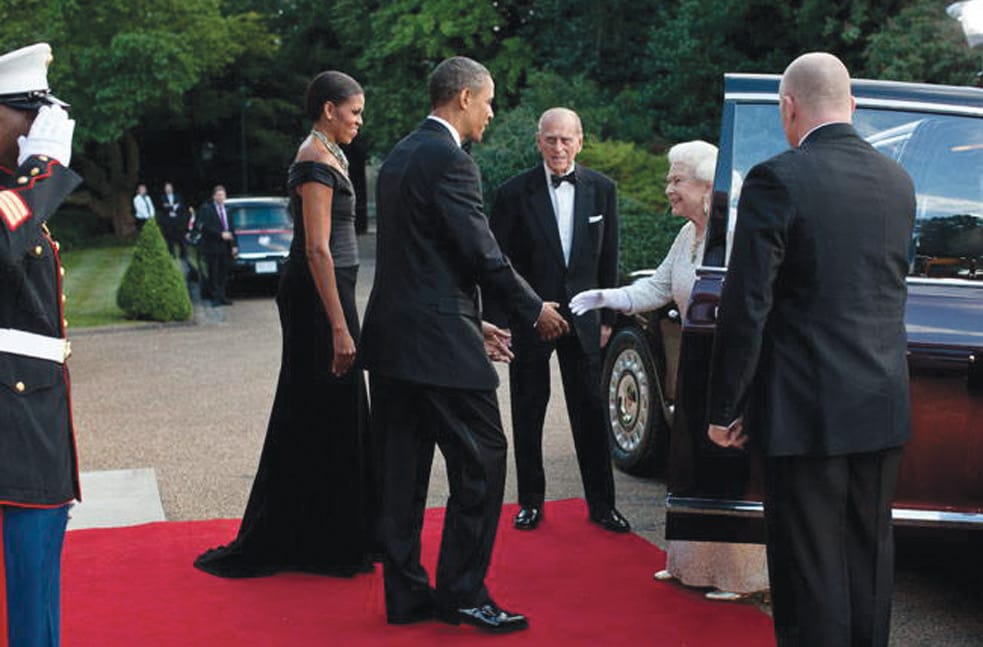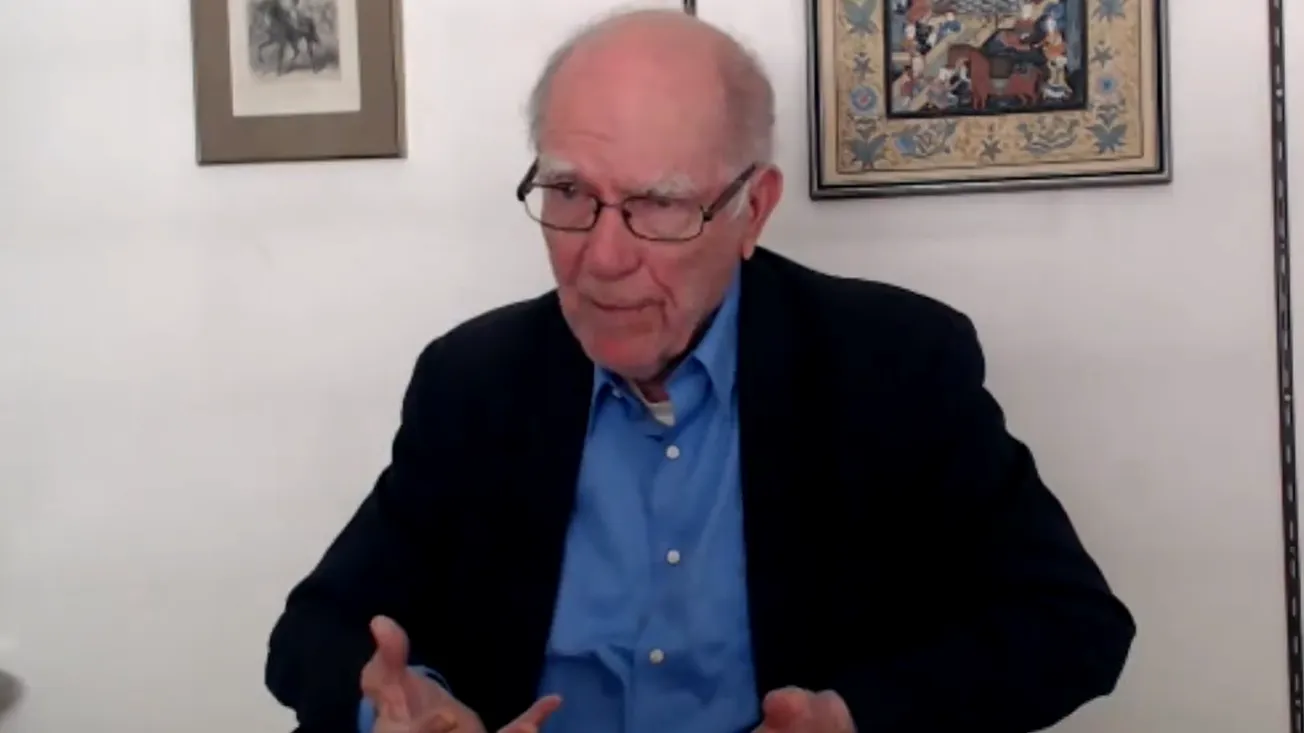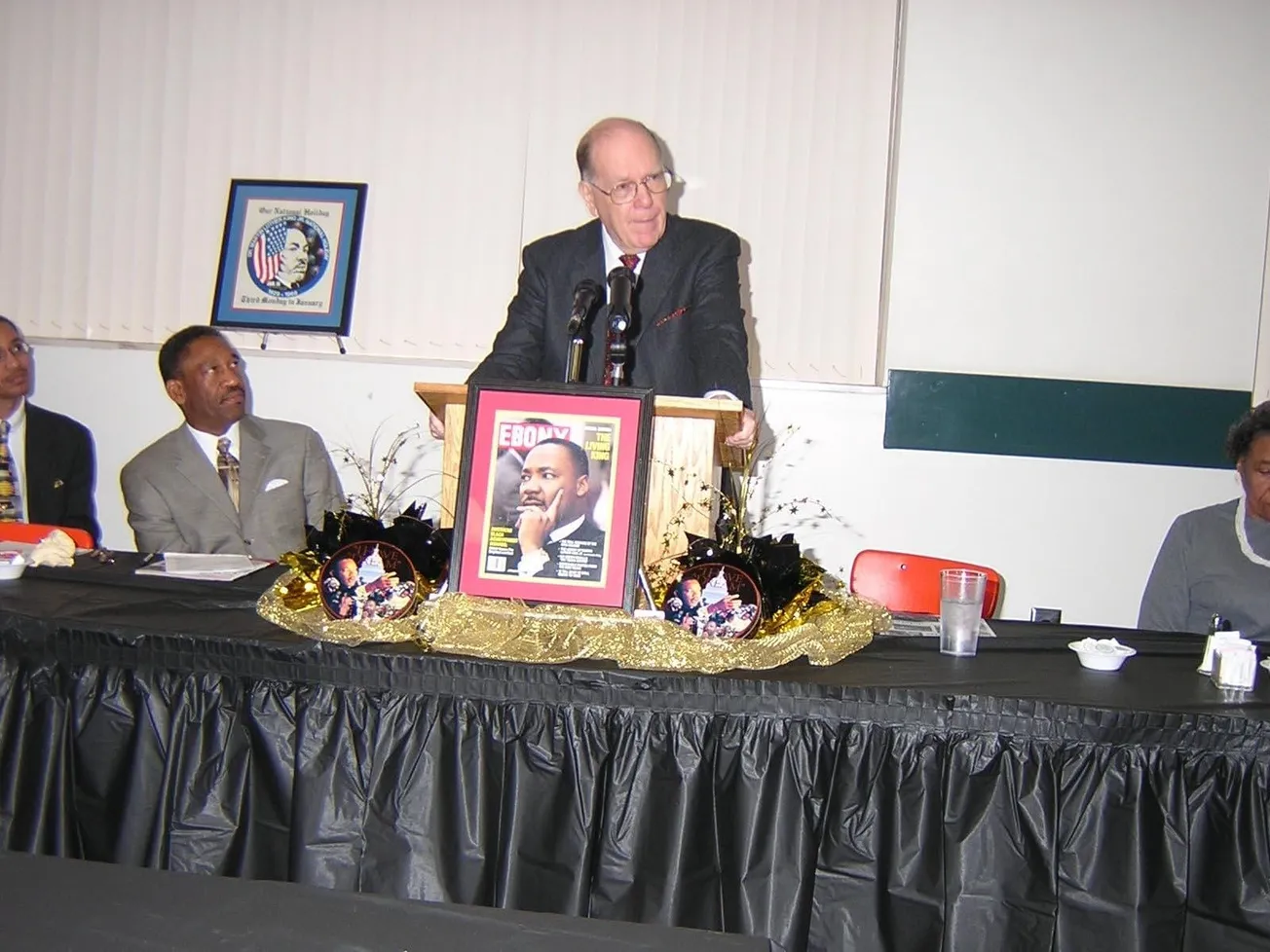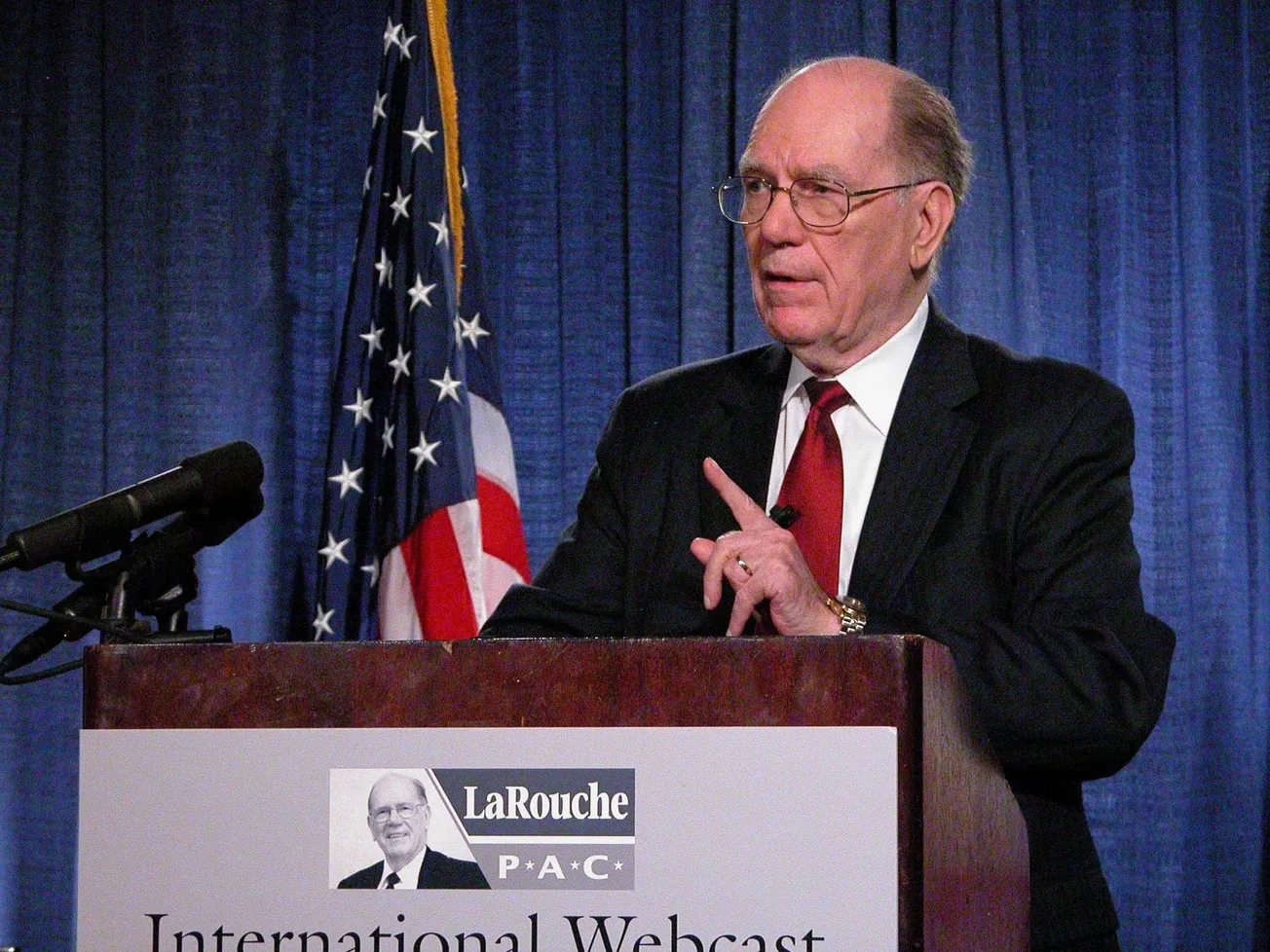Editor’s Note: EIR first published this article in Vol. 43, No. 25, June 17, 2016, pp. 4-15.
This is an edited transcript of Lyndon LaRouche’s June 11, 2016 dialogue with the Manhattan Project.
Dennis Speed: Lyn, if you would like, give us some opening remarks, and then we’ll go right to the Q&A.
Lyndon LaRouche: What is happening is that we have moved some of our action from Manhattan—not to take it away from Manhattan—but in order to bring a broader representation of what Manhattan is saying to the world.
Question: How can we impress on Congress the reality of what’s happening now on the borders of Russia? There could be just an accidental push of a button; or it could be a purposeful one by an insane leader in this country. The response from that would lead to a total world war, a total destruction of the planet.
LaRouche: I don’t think that problem is of that dimension in this quarter. The point is that there is an international resonance about the kinds of things that we are speaking about in terms of Manhattan. And I spend a lot of effort and concentration on exactly that. I have several responsibilities now internationally, and one of them is to make sure that the Manhattan organization, which is a leading influence body for the United States, that that body be heard and represented and duly informed.
Question: Hello, Lyn. I have a report and then a question. So, the report is that we have been having a very explosive response from people in the organizing this week. It’s been around the whole fight to get out of NATO and to mobilize the American people to even know there’s a danger of war, such that we had, for example, long lines of people stopping at a table where we had five organizers. One of our organizers was able to create a debate on this World War III danger. And this really provoked a lot of response from the population to come up and challenge him. So, the population was responding to that.
The question is, this petition is obviously mobilizing a lot of people, and that’s good. But we want to know if it is viable for a NATO country to follow our demands? To actually leave NATO before the Warsaw summit happens? And for example, one case is de Gaulle. He pulled his troops out of NATO at one point. So, we wanted to just get a response on that.
LaRouche: I would say that we have to take the responsibility for what the people in the United States can and will do. That’s the primary consideration. The question then becomes, how will people in other nations of the world also respond to that kind of response? In other words, when people in the United States express and reveal what their views are on the issues facing the United States and beyond, that is what is important for us—is to get a picture of what the American citizen is doing; and what the American citizen is doing by way of thinking, and what decisions are being made.
Now, you know that Manhattan has a history, when the British and the Saudis perpetrated mass murder on the citizens of Manhattan—and I should say that that fact is sufficient to condemn those who continue to tolerate the crimes committed by the President at that time, and by the Saudis and British.
What is the Standard?

Question: Could you say something more about this question of institutional collapses, and the way that the crumbling of institutions actually opens up people’s capacity to respond more intelligently to the options that we’re presenting? What do you think about this Brexit business? Is this just going to fly by as a news item, or is this. . .?
LaRouche: No, look, we’re talking about an international affair; and people are talking about—oh, some people are talking about this, some people are talking about that, they’re talking about different natures about that. Nonsense! The whole planet is at risk; the entirety of the planet is at risk. And what we’re trying to do is not to save some part of the nation, or nations, but rather, to defend this national system from destroying itself. And by taking the measures which will enable that system to defend itself against the kinds of folly that Obama and the British Empire represent.
Question: I wanted to take up with you from a question that Helga responded to earlier in the week, from someone who had some relationship to the organization, had been attending meetings, and was asking Helga to respond to the reality he faces of being chastised, through his association and through his expressing the ideas he picks up from this organization.
And for those people who are coming to us, the whole idea of our cultural work becomes essential, because in Helga’s response to this fellow was the idea of developing inner beauty, where you then can know truth, where you want to know truth, and you then can stand up to the silly, stupid neighbors around you, and then eventually, win them over, because you’re actually sane and showing some courage. So, around this idea that Helga responded to, we’ve talked about it a lot. You’ve talked about it. As we continue our fight, what can you tell us more about this and our work here?
LaRouche: I think it’s what Helga, my wife, has done in her time on this issue; and I think the whole nation can be brought into an understanding of this process. What we have to do is lay out how the process works. And then we have to go out and work, and make sure that it does work. We’re getting great work from the people in defense of nations at various times; what we’re getting is wonderful. I wouldn’t worry about that. I think, just do it. Just present the case, identify the case, bring up the key points, and let it go.
Question: My question is returning to the crimes of the Saudis and the British, and the people, including Bush and Obama, who have covered this thing up. When we have discussed this, we have talked about the idea of justice for the victims of 9/11, but the very idea of justice is not well understood in this culture. So my question is: What is this justice that we’re seeking; and how could we communicate about that over these next three months as we lead up to the 15th anniversary?
LaRouche: I think that that’s too simple, in a sense, because it’s much more complicated. The question is, how did people react, to the discovery that a terrible crime is being committed by a major force in some parts of the United States and parts of other nations? That’s what the issue is. You have to get not to the point of some issue as such. It’s not a local issue. But you have to bring forth what is the standard for the support of the requirements of a human being, or human beings, in order to bring mankind into a more successful form of realization of what mankind is. It’s just that simple. I can repeat it in various terms and various ways. But this is not a question of something personal in a simple way. What is the issue of mankind? Einstein. Use the word Einstein. Don’t try to give some other shorthand on it. What Einstein intended, is exactly what you and we should intend. . . .
Use it. It may not be the most perfect expression of the thing, but do it anyway. You need to do something quickly that’s going be useful to many people. Do it.

What Defines ‘Human’?
Question: Hi, Lyn. What you addressed last week, when Daniel asked his question about “Can genius be taught?”—there was a point in the discussion where you said, “Somebody becomes a genius; and it’s not becoming a genius, it’s that that quality of genius infects them, they have it. And then, if they are smart, if they are up to living to what they should be, they will express what we call ‘genius’. ”
And that idea really resonated with me throughout this last week, and we were getting this explosion in the field. But I think it requires not just the potential in the population, but also that we are rising to the challenge of providing that kind of real genius, leadership like Einstein, and not being practical.
So, I wanted to address just this specific point that you made that if people are up to the challenge of living up to that standard. And this is what I see—that when you’re tested, then you see really what somebody is made of. And life brings each and every single one of us certain tests. And there’s a difference between those exceptional people who rise to the challenge of those tests, and take on the real challenge—emotional, intellectual challenge of leadership.
And what I wanted you to address more was this emotional education . . . people really having this kind of emotional education, so that when they are tested with the real question of “Am I going to take up leadership at all personal expense for the future of mankind?”
Anyway, I wanted you to really address this question of the emotional education. If Einstein had given in out of fear, if he wasn’t totally gripped by these ideas that infected him, if he had given in in any form, we wouldn’t have had the great benefits of Einstein. So, I think you get what I’m trying to get at. But we really, we have a lack of that emotional education in people which gives them the courage to not be practical and to be courageous.
LaRouche: Well, I would say, let’s shift your choice of character for attention at the moment, not to reject anything about it, but just to simply use a different comparison. Krafft Ehricke. Krafft Ehricke was the founder of about everything: about the Moon, about almost everything. And he was faced with a disease which prevented him from actually dealing with internal conflict, the medical problem,— well he was going to die anyway. He had choices of two ways to live, but what he had was two ways to die. Now, and what he has done, and what he has delivered, and what those who followed him have done, is that. So, while it seems like the naming of a particular person, of being a particular figure, it’s not that, but something much more general.
What is the quality, looking at it from the standpoint of Krafft Ehricke’s history, what is so sacred about what Krafft Ehricke represented by the time he had died? And that says there’s a higher standard of measure which defines the meaning of human; human is not limited to a human person. It is defined in terms of humanity in general; and that’s the way to look at it. It works that way.

Question: I want to ask a question that comes up in the organizing. Helga, in her presentation to the San Francisco conference, was clear on the necessity of us presenting internationally, but also to the American people, the absolute danger represented by the war provocations by the NATO drills being done in Eastern Europe, directly provocative to Russia. They’re doing drills where you have U.S. armed forces driving from Germany up to Russia’s border with the explicit intention of preparing for an ostensible Russian invasion [of the Baltics], which Russia has not announced, or as far as I’m aware, prepared for, or intended to do.
So we’ve done that. We’ve had a series of deployments, very high profile with large signs: “Leave NATO.” We have this petition, and as I understand it, will continue this initiative, building into the Warsaw summit in a couple of weeks.
I wanted to bring up a question that had come up among some of the organizers, where you had discussed some of these war provocations as “bluffs.” That there’s a bluff involved with these powers and I want to see if it’s a bluff, but it’s still a dangerous bluff, how exactly to take this?
LaRouche: It is a dangerous bluff. It is a dangerous bluff. The issue is, how will you deal with this bluff? And you can win. We can win, but the point is we have to not give in. Because what’s happened? Look, the British system, the entire empire, which is the Satan incarnate, essentially, that thing can be defeated! It is being defeated! Obama is the major source of complaints on this account. Obama is the best example of pure Satanic motives, himself!
So the point is, the question lies not in who is going to do this, and who is going to do that, as such, although those things have importance. The issue is, what will the American citizen, or the European citizens, do, in terms in response to a Satanic force, like the British Empire, or Obama, who is a real killer?
Look Inside Yourself
Question: My question is coming up to you, because, as an activist in the group, I’ve noticed a few things, talking to people. First of all, they will sometimes put you off, and the most significant person I talked to, turned out to be this lovely woman who is a physician and has now joined us. And in talking to her, the first thing she said was, “Putin is insane.” And I pointed out that Obama is insane. And I asked her things about the NATO provocations, and asked if she knew about them, and asked if she knew the history of Russia and the United States. And I went through the history of how Russia has never let us down, they’ve fought with us in several wars—the American Revolution also, the Civil War, and World War II.
And I said, Obama, with his British handlers, through NATO are provoking war, and if it’s a war, it’ll be a nuclear war. And then, she sat and looked at me, and said, “You know, you’re right.” And I said, “Yes, so you agree? Obama is insane, and Putin is actually just Putin.” So she said, “Yeah, that’s true.” And as I spoke to her, another thing came up, and that was the music. I told her about our music. And, lo and behold, she’s going to join us. She’s going to come to the conference and deal with the music that we present.
So I just want to bring it to you, and say, can you give a little more insight into what Daniel was talking about, and what Michelle was talking about: that truthfulness in us, that comes out when we stick to the truth, and that we can find things out about people, that will actually lead them to even more things like our music?
LaRouche: What you’re really dealing with is the fact that there’s a popular way in which people commonly interpret social relations. But these things are really not crucial. They can be pesky, a terrible nuisance, but they are not essential to mankind. What is important is what mankind can find in mankind’s own self. Now, that’s not such a tough job; it is a tough job in one sense, but if mankind, the individual person, can look into themselves and find the real moral principle inside themselves, a principle on which they would act for the purpose of supporting Manhattan, or any other part of the city, or the world, that’s it!
We have to, in ourselves, come to a judgment on what is right, what is right about mankind? What are the characteristics that distinguish mankind from the beasts and animals and things of that sort? And that’s it.
And when you can get on that, when you can look at a terrified person—and there are many terrified persons all over the world these days—and if you can lift their faces, where they can see a hope, a way of working, we can lead to a solution, that’s what you’re really shooting for. It’s not a doing this, or doing that: The question is, can you yourself find, in yourself, the way in which to bring mankind out of the darkness.
A Process Underway on the Planet
Question: [Elliot Greenspan] Hi Lyn, I want to pose two aspects, interrelated: One is that you have emphasized, in a series of discussions over the last days, that much of your concentration is on institutional change, that you’re working to transform institutions. I would be grateful to the extent you want publicly to elaborate on that.
But let me pose the second part and you’ll see the connection, which is that we are dealing with the population by and large which is brainwashed here, which is deeply beset by a pervasive, fundamental belief that change happens electorally, or congressionally, or through interest groups, or lobbying, or all of these things that Americans have been fed for a long time. And for a long time, we’ve not had fundamental change in the right direction in the United States; that has a great deal to do, I think, with that kind of bias, that kind of prejudice, that kind of conceit, as to how political change occurs.
You, on the other hand, have developed a process and a commitment to political transformation, based on what you call “the principle of the strategic flank.” You referenced, for example, MacArthur. You look at the various initiatives, the Manhattan Project, the choral work here, the 28 Pages, what Kesha’s doing, the space initiative, the Silk Road, the NATO initiative—these are flanks. And what I think would be invaluable for all of us, is how you think about and generate such flanking actions as the unique basis on which historic, necessary political change occurs; perhaps that then goes back to your thinking about institutional change in the immediate period ahead.
LaRouche: The immediate thing would be what you’re going at indirectly, and also directly at the same time, which is the fact that if you want to understand how mankind can survive despite the kinds of evil which dominate much of the planet right now, you have to look inside yourself, find something inside yourself which is so convincing, by its nature, that you say naturally: “Hey, wait a minute, everything I’m doing is insane!” Because what I’m doing, is I’m doing something which I’m trying to get an advantage for. And I say, No, there are no such things as advantages like that. There are no advantages that exist like that. All you can get, is to win. Now, what do we mean by “win”? It means, win—to gain the ability to perform the functions of human development.
So therefore, it’s not something which is a property of this, a property of that. The question is what you, in yourself, inside yourself, what you really embody. Do you have the ability to pick up those values which must be served, for the sake of humanity as a general phenomenon? Without that, you are not armed. You are disarmed.
And I think you won’t have any trouble looking through that, and thinking about it, because I know you.
Question: Hi Lyn. I have a question from Avneet, so I’ll be reading that to you. The Indian Prime Minister recently visited Washington, D.C. and inspired Americans again, like he did two years ago, when he spoke at Madison Square Garden. In his Congressional speech, he invoked Lincoln and emphasized that we have to be united to fight terrorism.
Westinghouse now plans to build six nuclear power plants in India. Modi also emphasized that India is now a global leader, and he mentioned the projects in Afghanistan and Iran that India is investing in. So overall, you have a completely different, palpable environment in Capitol Hill. What do you think of all this?
LaRouche: I think that there’s a process under way in which much of the planet, among nations, wants to do the right thing, so-called. That is, to bring about the kind of conditions of life, as prospects and as realities, which are needed for humanity’s existence.
That’s where I stand. I think there is no other choice which is competent. And what the problem has been, is that we have nations which, like the British or like Obama, who’s an evil fellow himself, that these kinds of things, these forms of evil, bring down on mankind generally, but they bring down finally against mankind generally, himself.
Question: Hi, Lyn. You mentioned the Kra Canal in recent discussions, and you said something very specific about it, early in the week about how this would be, for example, if the activity that you began 30 years ago, with the Mitsubishi Corporation and associates from Japan, to get this thing built, that this would change the nature of everything. And you re-emphasized that in a different way this week. I thought it might be appropriate to discuss it.
LaRouche: The key thing, the first thing in this light: India. And if India were to open the gates, there, what you would have, you have an immediate change in the entire character of the water systems around the world. Especially the trans-Pacific matter.
So that was there. It’s been there all along. There is a tempering now, to go into that, to realize that, to bring it back into reality, the way that Japan did in that period, because Japan was resolved, at first, to keep the Kra Canal program going. They gave up on the idea, but the idea has always persisted. And that Kra Canal operation is probably one of the most important issues for all mankind, now.
Question: Hi Lyn. So, I’ve been doing a lot of work to build the chorus in Brooklyn and in the area, and a thing that I’m running up against is that I do run into a lot of people who are interested in joining it, but then they’ll come for a little bit, and then they won’t come again. I want to get your thoughts on how we can escalate so that we can build this up, so that by the time in September, we have a major breakthrough.
LaRouche: Well, this is not a mechanical question, and the tendency is to look at this as a mechanical question. “Can we convince this guy to go along with this thing?” Well, that is not the way to do it. The point is that the individual as a musician, the individual musician, is the actual source of the passion which motivates creative music, and creative entertainment in general.
So you’re not looking for a recipe. You’re looking for something inside yourself, and you’re trying to find out if you have inside yourself the kind of thing that will bring you and cause you to present a competent performance! There’s no other solution. You have to do it.







